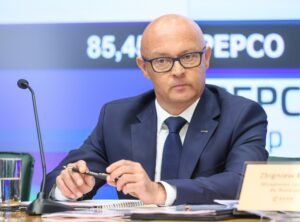Polish and Lithuanian relations have recently improved. They share longtime history, are NATO and EU members and it turns out that they perceive their common problems similarly. We talked to the foreign minister of Lithuania Linas Linkeviczius about threats and opportunities of the neighbouring countries.
BiznesAlert.pl: How would you describe what is going on between Poland and Lithuania these days?
Linas Linkevicius: I would say, there are some symptoms of improvement. We have more regular contacts and common plans for the future. It still needs to be improved though. During my last visit in Warsaw in January I suggested a comeback of bilateral commissions, so that the experts would talk. Obviously talks on political level are necessary to define priorities, but security and defense commissions haven’t met for five years. The same with culture and education – we have many issues and problems that need to be solved in those matters. Warsaw now has to issue dates for setting a bilateral defense and security commission that would be on the level of deputy ministers. A certain breakthrough was a meeting of our prime ministers, but the very first good sign was the agreement between Orlen and Lithuanian Rails. What we need to do now is to fully use our potential.
BiznesAlert.pl: What do we need to do reach a full satisfaction in Polish-Lithuanian relations?
We have to work in every area that needs improvement. Needless to say – we are neighbors. Infrastructure and energy projects are a good start; we are very grateful to our Polish partners for their attitude towards the Ostrowiec power plant – that is crucial for future synchronization of our systems.
Did you achieve an agreement on a way of synchronization?
Poland and Lithuania share a view on this issue; now it’s time to convince other Baltic states, which is a bit problematic, but we’re working on it. We have also signed financial documents for gas interconnectors to synchronize our systems. Poland and Lithuania have their terminals, Latvia and Estonia are planning their own.
How do you perceive competition among the Baltic states and Poland on gas market?
Competition on a free market is a very good thing, but apart from that we need to keep working on our communication. I think we’re getting along better with Poland when it comes to LNG or electricity. Baltic states have been competing with one another for a long time. Time is also important, that is why we have decided to import energy from Sweden and build an LNG terminal. We cannot wait endlessly for others, we need to take matters into our own hands.
Will Latvia and Estonia catch up with the synchronization?
Our systems do not need to be synchronized in the same way; Estonia wanted to cooperate with Finland for instance. Nobody is forcing anyone to anything. The most important thing for us is that Polish-Lithuanian cooperation is on a very good level.
We also have to deal with external factors. What is the role of hybrid warfare and threat of Russia? Lithuanian authorities suspect that recurrent problems of NordBalt might have something to do with Russian activities.
We might have predictions, but we do not have proves. First problems occurred already in 2015 along with Russian military exercises. I called it military hooliganism back then – it was not illegal, but Russians changed limits of the area, entered economic zone without reporting and infringed free sailing of ships, including two ships engaged in construction of the cable. It caused damages and nobody paid for it. This does not mean that current problems are caused by Russian activities. Their attitude towards the project was not at all positive though.
How does Nord Stream 2 influence the future integration of Europe? How can Poland, Lithuania and other critics of this project respond to it?
Good question. We’re adjusting certain policies like energy union, third package that were invented to diminish monopoly rights of energy suppliers. We politically agree that there should be some principles, but they are not implemented in practice. We could ask questions like why we do not have a similar attitude towards Nord Stream like we did towards South Stream. Is it about double standards? We do not perceive it as a commercial project, rather a geopolitical one. The main point of it is to punish Ukraine. Smaller countries should not have smaller rights than the big ones. It undermines the main idea of the European integration.
How do LNG terminals and projects like Baltic Pipe re-arrange status quo in Central and Eastern Europe?
Everybody does what they need to do. Our task is to develop our infrastructure and diversify sources of supplies. Here I see a big role for the USA. I’m glad that our terminal in Klaipeda received the first American LNG delivery. We have to go these lines, the same with infrastructure. We should take it seriously, until a couple of years ago this subject was not treated strategically by the EU. A country might be a member of NATO and EU, but when its energy supplies are tied to one single source, and this source is a country that manipulates, guided not by economy but politics, it cannot be independent and secure. We still need lessons to be taught, and unfortunately they might be painful.
Does Europe necessarily need painful lessons, or Poland and Lithuania might give it new energy?
During the Georgian-Russian war in 2008 we stressed that we really need to resist, otherwise incidents like Crimea annexation might happen. And it did happen. We must change our attitudes and and act with more solidarity. I’m though afraid that we do not learn enough from our mistakes.
Interview by Wojciech Jakóbik








